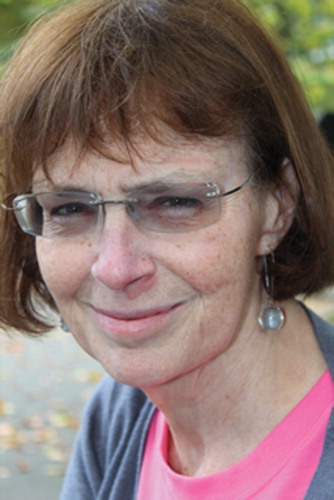Professor Katrina Honeyman, a former joint editor of Textile History, a member of the Pasold Research Fund, and a distinguished economic and social historian of the textile industries, sadly passed away on 23 October 2011, aged 61, after a battle against cancer undertaken with great fortitude.
Katrina was born in London in June 1950, but moved with her family at an early age to Manchester, where her father John became a textile chemist with the Shirley Institute, the research centre for production technology in the cotton industries. She graduated with a degree in Economic History and Sociology from the University of York. Her interest in the history of textiles was no doubt stimulated by the research interests of economic history staff at York and the field trips to West Yorkshire that they organised. Her background in both economic history and sociology helped determine the direction of her later research. After a year of school teaching, she embarked on postgraduate research at Nottingham University under Professor Stanley Chapman and completed a doctoral thesis: ‘Origins of Enterprise: A Study of Social Mobility in the Industrial Revolution’.
TEXTILE HISTORY, 43(1), MAY 2012
After temporary lectureships at the Universities of Aberdeen and Manchester, Katrina was appointed to the School of Economic Studies at the University of Leeds in 1979, moving to the School of History in 1999. She was appointed Professor of Social and Economic History in 2008. Her first book was a study of business leadership in the industrial revolution. This was followed by Technology and Enterprise: Isaac Holden and the Mechanisation of Woolcombing in France, 1848–1914 (1986), an excellent history of business enterprise and creativity written jointly with her then partner, Jordan Goodman, and published in the Pasold Studies in Textile History series. It was followed by Gainful Pursuits: The Making of Industrial Europe, 1600–1914 (1988), also written jointly with Goodman. Katrina’s subsequent research interests focused upon female and child labour and the gendered nature of work, primarily in the textile industries. Women, Gender and Industrialisation in England, 1700–1870 and Well Suited: A History of the Leeds Clothing Industry, 1850–1990 were both published in 2000. Well Suited, commissioned by Leeds Civic Trust, supported by the Burton family and published in the Pasold series, provided a detailed assessment of the rise and fall of the Leeds tailoring industry. Child Workers in England 1780–1820: Parish Apprentices and the Making of the Early Industrial Labour Force, published in 2007, traced the lives of pauper children sent by parish authorities in London and elsewhere to the textile factories of the north. Katrina challenged long-standing negative views of this process and showed that many of them subsequently benefited from the skills they acquired. At her death she was continuing work in this area, following the subsequent life experiences of indentured young workers for a planned book After Apprenticeship, as well as collaborating with Leeds Museums on a high-street fashion project and researching the history of Marks and Spencer through Leeds University’s recently acquired business archive of the company.
During her time as Joint Editor of this journal, Katrina produced our first supplementary issue, jointly with the Centre for Textile Research at the University of Copenhagen: Textile History and the Military. The issue explored the complex relationships between textile production and use and military requirements.
Katrina led a remarkably busy life, with several research projects always on the go; supporting her two sons Danny and Ben, not least in their (and her) enthusiastic support for Arsenal Football Club, travelling extensively to matches in Britain and Europe; and in serving with commitment professional and academic organisations, including the Economic History Society, for which she served two periods on its Council, and the Association of Business Historians. Within the Leeds School of History she was a dedicated teacher, an inspirational and encouraging mentor of postgraduate students, and active in many roles in the School, not least in supporting the growing number of younger women colleagues. She led the University’s Centre for Business History from 1993 to 1997. In recent years she had found personal happiness with her partner John Barber, who was a great support after her diagnosis of cancer. She continued to research and travel until a few weeks before her premature death. She leaves important research unfinished and a legacy her friends and colleagues will remember of friendliness, good humour, generosity and consideration for others.
David Jenkins
